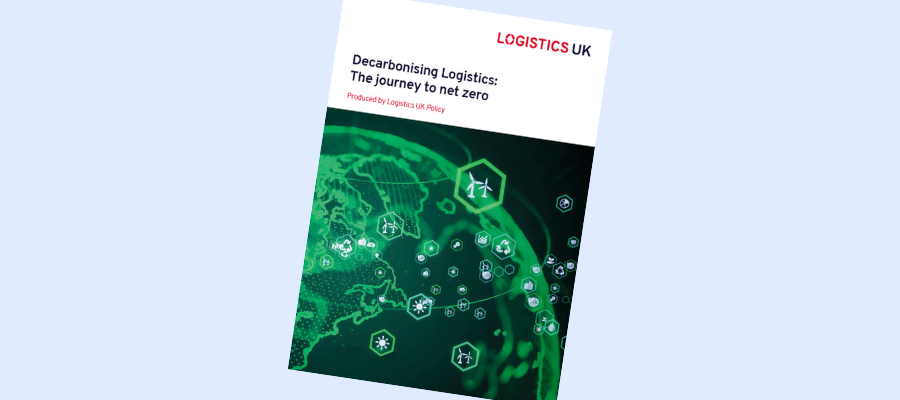🕒 Article read time: 2 minutes
The road to decarbonisation

Climate change is one of the most pressing challenges on the logistics industry’s agenda and many businesses within the sector are already taking great steps to support the UK’s decarbonisation targets.
However, several significant barriers remain regarding the most efficient and commercially viable ways to reach net zero and transport remains the largest contributor to UK greenhouse gas (GHG) emissions at 27%.
ROAD TRANSPORT IS BIGGEST EMITTER
Most transport emissions are the result of road transport; this mode is also viewed as the aspect of transport which can contribute the greatest, and swiftest, reductions in total emissions. While the GHG emissions generated from both light and heavy commercial vehicles are significantly less than those generated by cars and taxis, the logistics industry understands all road transport vehicles must play their part if the sector is to reach net zero.
LOGISTICS UK REPORT ASSESSES SECTOR’S PROGRESS
Decarbonising Logistics: The journey to net zero is Logistics UK’s latest report. It explores the industry’s progress towards decarbonisation. The report assesses current progress against the UK government’s policy framework and looks in detail at its policy direction, fiscal incentives, relevant technology and infrastructure developments, and test projects. This report also highlights the priorities if the industry’s decarbonisation journey is to be achieved and make net zero a reality.
FIVE-YEARLY CARBON BUDGETS
As well as the legally binding commitment to achieve net zero GHG emissions by 2050, government must set five-yearly carbon budgets that place caps on the total GHG emissions allowed in that period. While the first (2008-12) and second (2013-17) carbon budgets have been met and the UK is on track to meet its third (2018-22), the Climate Change Committee has raised concerns that the UK is not currently on course to meet its fourth (2023-27) or fifth (2028-32) targets. As a result, reductions in GHG emissions will need to accelerate to ensure that greater progression towards net zero can be made from all sectors of the economy.
PAYLOAD CHALLENGES AND OPPORTUNITIES
There are many opportunities and challenges across the logistics sector to decarbonise and the route to achieving that target will vary across businesses depending on fleet sizes, and the type of vehicles used. One key issue yet to be solved is that zero emission technologies – particularly battery electric – will be heavier than the current petrol or diesel vehicles operating on the UK’s roads. This will challenge operators to lose payload – and therefore may require fleets to increase their number of vehicles – or result in increased regulatory requirements; this is likely to be of particular significance at the current 3.5 tonnes threshold. As a result, Logistics UK is urging government to explore appropriate regulatory thresholds for zero emission commercial vehicles, particularly as these vehicles increasingly become ‘the norm’.
“This change will have to be balanced against road safety risks inherent with increases in gross vehicle weight, which existing regulatory thresholds are intended to mitigate,” said Michelle Gardner, Head of Public Policy, Logistics UK, “Safety must remain a top priority for all road users.”
INVESTMENT NEEDED IN BOTH INFRASTRUCTURE AND VEHICLE TECHNOLOGY
Owing to their size, HGVs are much more complicated to decarbonise, with cost-effective and commercially scalable alternative technologies still being sought.
“While Logistics UK is pleased with government’s £200 million investment to continue its zero-emission HGV trials,” Gardner said, “the correct supporting infrastructure, including cost effective, nationwide refuelling networks and sufficient power supply must be in place for these vehicles to offer commercially viable alternatives to diesel HGVs.”
HIGH COSTS REMAIN A BARRIER
High acquisition costs of alternatively fuelled vehicles remain a significant barrier for businesses, alongside refuelling and recharging infrastructure. Charge points for plug-in vehicles are being rolled out rapidly but more focus is needed on the requirements for commercial vehicles. Logistics depots and sites require sufficient electricity capacity to achieve rapid fleet recharging, while employees who need to take their vehicles home must not be forgotten. While technology development continues for zero tailpipe emission HGVs, future proofing energy infrastructure for these vehicles will avoid additional costs and delays.
“The UK’s legally binding target to achieve net zero by 2050 will drive unprecedented change in the logistics sector as it transitions away from fossil fuels,” Gardner said, “Our industry is working hard to make significant changes to the way it operates but the scale of the task should not be underestimated, with businesses needing long-term policies and confidence to invest in lower emitting alternatives. Logistics UK will continue to work with members and government to ensure solutions for the most efficient and effective transition to net zero are sought.”
*www.logistics.org.uk/environment
Published On: 30/06/2022 16:00:52

Comments Section
If you are a Logistics UK member login to add comments.